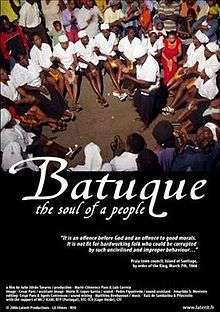Batuque, the Soul of a People
Batuque, the Soul of a People (French title:Batuque, l'âme d'un peuple) is a 2006 documentary film written and directed by Júlio Silvão Tavares about the batuque musical group Raiz di Tambarina, and roots of this musical genre in Santiago, Cape Verde.[1][2][3]
| Batuque, the Soul of a People | |
|---|---|
 Theatrical poster | |
| Directed by | Júlio Silvão Tavares |
| Produced by | Marie Clémence Paes Luis Correia |
| Written by | Júlio Silvão Tavares |
| Cinematography | Cesar Paes |
| Edited by | César Paes Agnès Contensou |
Production company | LX Filmes Laterit Production R.F.O. |
| Distributed by | LX Filmes (Portugal) Marfilmes (worldwide) |
Release date |
|
Running time | 52 minutes |
| Country | Cape Verde |
| Language | Portuguese Creole English subtitles |
| Budget | €2,000 |
Synopsis
African slaves were first brought to Cape Verde by Portuguese settlers in 1462. These slaves brought with them the cultural rhythm and music which would become Batuque: a musical form punctuated by drums while participants danced in a circle. The dance, repressed during the Colonial era, has been adopted as a symbol of the Cape Verdan cultural identity. The film seeks to document the dance form through interviews and performance by the musical group Raiz di Tambarina.
Cast
Production
Batuque, the Soul of a People was Silvão's first film. He participated in a course with the Africadoc network before beginning production. The film was initially pitched by Silvão in Senegal, filmed in Cape Verde and edited in France.[4]
Reception
Release
The film was screened in Lisbon in November 2010, with the filmmaker in attendance, before traveling to festivals in Brazil and the United States.[5] It had previously screened at Africa in the Picture, Netherlands,[6] the Copenhagen International Documentary Festival, Denmark, the 24th International Documentary Film Festival Amsterdam, Netherlands,[7] the Africa in Motion film festival, Edinburgh, Scotland,[8] and the AfryKamera Film Festival, Poland.
References
- "Soirée musicale capverdienne". La République des Pyrénées (in French). 9 June 2010. Retrieved 19 February 2012.
- "8/9: BloomScreen Film: Batuque, the Soul of a People". BloomBars. Archived from the original on 23 July 2012. Retrieved 23 February 2012.
- "Batuque. Cape Verde, 2007". Marfilmes. Retrieved 23 February 2012.
- "Júlio Silvão: "The closing of Cape Verde's movie theaters is an affront to culture"". A Semana. 15 June 2007. Archived from the original (Interview) on 4 March 2016. Retrieved 20 February 2012.
- "Júlio Silvão Tavares mostra "Batuque, A alma de um povo" em Lisboa". A Semana (in Portuguese). Cape Verde. 15 November 2010. Archived from the original on 3 March 2016. Retrieved 19 February 2012.
- "Batuque/ Batuque, a alma de um povo. Cape Verde Islands 2006". Africa in the Picture. Archived from the original on 7 July 2012. Retrieved 23 February 2012.
- "Batuque. Júlio Silvão Tavares, France / Portugal". International Documentary Film Festival Amsterdam. Archived from the original on 2014-09-25. Retrieved 23 February 2012.
- "Films". Africa in Motion. Retrieved 23 February 2012.
External links
- Batuque, l'âme d'un peuple at the Internet Movie Database
- Júlio Silvão Tavares at the Internet Movie Database